- Home
- Matt Forbeck
The Con Job Page 6
The Con Job Read online
Page 6
“They do it for charities. Kids love it. Besides, you ever heard about Civil War reenactors?”
Eliot pushed his sunglasses back up onto his nose as they walked into the hall. “Sure. People who like to dress up in wool uniforms from a hundred and fifty years ago and get sunburned pretending to be dead on a battlefield all day.”
“These are the same kinds of people. They just like the battle of Endor better than the Battle of Gettysburg.”
“You three are on the show floor now,” Nate said in their ears. “You need to focus.”
“Absolutely,” Sophie said. “Eliot, you need to concentrate on your accent. You’re supposed to be from Essex, to the east of London.”
“Right,” Eliot said, trying to imitate Sophie’s accent as best he could.
“Oh, no. You sound like Dick Van Dyke in Mary Poppins, guv’na,” Sophie said. “Try it like this.” She cleared her throat and shifted to a flawless Essex accent. “See, it’s not so hard now, is it?”
“Of course not,” Eliot said. “It’s nothing but a walk in the park.”
“Stick to pointing and grunting a lot,” Nate said. “Sophie will be doing most of the talking anyhow.”
“Fine,” Eliot said, irritated by the entire plan. “Who the hell is Warren Ellis again?”
Hardison gaped at the man. “Only one of the greatest comics writers in the past twenty years. Might as well ask who Alan Moore is, or Frank Miller, or Mark Waid, or Brian Michael Bendis, or Marv Wolfman, or Geoff Johns.”
Eliot gave Hardison a blank look as they wove their way through the hall. Parker took the lead, toting a printed sign with her. Eliot and Hardison trailed in her wake. They made a point of striding right past Patronus’s booth. They didn’t turn to see if he noticed them.
“No one?” Hardison said. “Nothing? Not even Kurt Busiek? Neil Gaiman?”
“I have a life. I do things, active things. I date women.”
“Stan Lee?”
Eliot gave Hardison that one with a wag of his head. “Who hasn’t heard of Stan Lee?”
“All right,” Hardison said with satisfaction. “You had me worried there, man.”
“You sure this Warren Ellis guy’s not really here?” Nate asked. “I thought all the comic-book people were in San Diego this weekend.”
“Nope,” said Hardison. “Checked his Twitter feed. ‘Not making it to Nerd Prom this year. Soldier on.’”
“See,” Sophie said. “Now that was a proper Essex accent.”
Eliot rolled his eyes. “Just get me to the damned booth.”
The trio descended on the booth the bootleggers had cleared out of. Parker got there first and set up her sign on the front of the table. It read: ARTISTS WANTED! Portfolio Reviews for New Publishing Start-up. Join us!
Hardison brought Eliot into the back of the booth. “You all set for this? Parker and I are your handlers. You’re the grumpy English writer crushing people’s dreams.”
“I got it,” Eliot said with a snarl. Then he tried it again with an Essex accent. “I mean, sod off!”
“Perfect,” Sophie said in a lilting tone.
Eliot sat down at the table and spread out his hands on the surface before him, feeling the white plastic lining that had been stretched and stapled over it. He kept his hat and glasses on, despite the fact that he didn’t need them in here. He would have preferred to ditch the glasses, as they made it harder for him to scan the distant faces in the crowd, but he knew that he didn’t look enough like the photos Hardison had shown him of Warren Ellis to pass for him otherwise. With the hat and glasses, he looked enough like someone who didn’t want people to recognize him, though, that he could pull it off.
“All right,” he said. “Let’s see what’s on today’s menu.”
He looked up and saw a young woman standing before him in a jeans and a stylish blouse, carrying a large, flat leather portfolio by its double handles. She glanced down at him with a nervous smile that looked like it might crack at any instant and send tears streaming down her face. “May—may I show you my portfolio, Mr. Ellis?”
Eliot stifled a sympathetic smile. “It’s Warren, my dear,” he said as he reached for the portfolio and unfolded it on the table before him. “Now, what do we have here?”
SIXTEEN
“Where the hell are you, Sophie?” Hardison said in her ear. “This portfolio review thing isn’t going well.”
“How’s that?” Sophie said as she rushed into the exhibit hall and felt the air-conditioning drop down on her like a weight. “I thought you had a line forming already. Isn’t that what we want?”
“The line’s great,” Hardison said. “But Mr. Ellis here has already sent away three people wailing in tears. I’m afraid we might wind up with a suicide on our hands before too long.”
“Doesn’t do you a damn bit of good to coddle you, now, does it?” Eliot said. He was speaking to the next person in line, but his words were meant for the rest of the crew. “I mean, how’re you going to improve if I just lie to you and tell you you’re fantastic?”
“Fine,” Hardison said, “but do you have to be so damn mean?”
“What some people call mean, I call a mercy,” Eliot said. “Now, let’s see what you’ve got here.”
Sophie tuned out the rest of Eliot’s conversation with the hapless artist in front of him and concentrated on the one she was looking for instead. She spotted Patronus standing on the edge of his booth, glancing at his watch. He looked back up and spotted her, his face brightening into an open smile.
“Miss Drew,” he said. “So good to see you again.”
Sophie reached out and squeezed his hands. “So sorry for running a little late,” she said to him. “The foot traffic around this place is just insane.”
“That’s one of the benefits of spending all day in the hall,” Patronus said. “I don’t have to fight any of that again until it’s time to leave.”
“I’m sure that has its own set of challenges.”
“You have no idea.” Patronus gestured to his booth. “But we don’t have to sell anything here—at least until Saturday. Dealing with browsers is so much easier than taking care of customers.”
“It’s wonderful that you’re going to donate a portion of the proceeds to the Hero Initiative. That’s such a good cause.”
“I’ll confess to a bit of self-interest involved in it,” Patronus said. “After all, I hope to someday be an aging but beloved artist myself.”
Sophie gave him a friendly giggle. “Let’s just hope you don’t wind up needing the money.”
“You help me with the first part of that plan, and I’ll do my best to avoid the second.”
“I have just the thing in mind. Do you have your portfolio with you?”
“What artist would come to Comic-Con without a portfolio?”
“Ones not looking for work, I’d say.”
“Then that wouldn’t be me.” Patronus signaled to one of the security men working the booth, and he hustled over with a large leather portfolio and handed it to Patronus. “We should be all set. Where are you taking me?”
“A little bird told me that a certain famous writer set up an impromptu portfolio review this afternoon. He’s on the hunt for fresh talent for a new publishing imprint he’s heading up for a major media corporation.”
Patronus raised his eyebrow at that. “Can I ask which one? It can’t be Disney or Time Warner. They already own Marvel and DC.”
“I’m afraid Mr. Murdoch likes to keep his little secrets.”
Patronus gaped at Sophie’s purposeful slip and then allowed a grin to grow across his face, showing all of his teeth. “What are we waiting for?” he asked.
Sophie led him toward the back of the hall and then over to Aisle 200, in which the booth the others had appropriated sat. As she led Patronus around the corner, she had to stifle a gasp. The line had grown, snaking out from the booth and across the cap of the aisle and then down the cross-hall lane until it disappeared into the cro
wd.
“I can’t believe the line is so long,” she said.
“It can’t be that bad,” Nate said in her ear. “How many wannabe artists can there be at the convention?”
“You don’t know these people, Nate,” Hardison said. As he spoke, he motioned for Sophie to join him in the booth. “They all want to be comic-book artists. If we’d have advertised this in the convention program, we could have been here all day.”
“Excuse me,” Parker said to the people standing in line to see Warren Ellis. “Can you let Mr. Ellis’s friends in, please?” She raised her voice to an obnoxious shout to make sure she was heard.
A few of the people grumbled about the interruption and the fear that someone would be cutting ahead of them in line, but the people standing between Sophie and the booth moved out of the way despite that. Sophie took Patronus by the hand and then snaked her way through them, past the table at which Eliot was examining a tattooed and pierced young man’s portfolio of skateboard art, and onto the patch of open concrete behind him.
“Jess!” Hardison stuck out his hand. “So good to see you again. How’s your son?”
Sophie smiled at Hardison and shook his hand, then pulled him into a brief hug. “He’s great. He wishes he could be here, but his father wouldn’t let him go this summer. You know how it is.”
“All too well. If you’ll give us just a minute, Warren’s finishing up with this latest hopeful.”
“It’s not bad for something you’re going to slap on a skateboard or use as a tattoo,” Eliot said in his awful British accent. “But I’m looking for real illustration here. Your sense of anatomy’s spot-on, but you don’t seem like you’re able to show any depth in these samples. Work on your perspective. Pick a focal point and draw the vanishing lines toward it to help frame it and give it a sense of dynamism. There’s really no cheating around that until you’re much better than this.”
The young man—a brutally sunburned punk who looked like he’d just stepped off his father’s Harley and had something to prove—stood there and nodded along with Eliot’s critique. “Thank you, Mr. Ellis,” the artist said, his voice cracking. “I really appreciate the feedback.”
“He took that well,” Nate said through the earpiece.
“He’s here for advice,” Eliot said as he turned around to greet the newcomers. “I’m just telling him what he already knows. Now he knows what to call his troubles, he’s got a chance to fix them.”
Behind him, another hopeful artist stepped up to the table. Her face fell when she saw that Eliot had turned his back on her.
“Mr. Ellis is taking a three-minute break,” Parker said. “Please remain in line so that you don’t lose your place. He’ll be back with you shortly.”
“Warren?” Sophie said. “I want you to meet someone who’s not going to need any of that advice from you. He’s ready to go as is. Lorenzo Patronus? Warren Ellis.”
Patronus stuck out his hand. “I’m a big fan, sir.”
Eliot shook Patronus’s hand with a smile. “Then I like you already.”
“Can he show you his work, Warren?”
Eliot sucked at his teeth and considered the line of people waiting to see him. “It’s a bit unusual, I’m afraid.” Patronus’s face fell, but before he could utter a word, Eliot continued on. “But anything for you, Jess. I don’t forget my friends. You know that.”
“Oh, I didn’t want to impose on you, Warren.” Sophie gave a bashful flip of her hair.
“Nonsense. I remember the good turn you did for me in London last year. It’s the least I can do.” He turned to Patronus. “All right, big fan, then. Show me what you’ve got.”
Patronus fumbled with his portfolio until he got it open. “I’ve been trying out some new brush techniques with my inking,” he said. “I think you’ll like it.”
The portfolio consisted of a number of large spiral-bound pages sitting inside plastic sleeves that held the artwork and protected it. Eliot reached down and began to flip through the pages while Patronus held the portfolio open.
“I see what you mean. It’s a curious technique. Hmm.” He flipped a few more pages. “Can’t say as how I care for it.”
Patronus’s face fell. “Honestly, sir,” Eliot said. “I don’t think your inking is your strong point. I wouldn’t try to sell yourself on it. You’ve taken perfectly excellent line work here and obliterated it behind trails of misapplied blackness.”
“But I—” Patronus turned to Sophie for help.
“I understand what you’re saying, Warren,” she said, “although I think that’s clearly just a matter of taste.”
“I’ll grant you that, Jess,” Eliot said. “But then again, if I’m heading up this new division, then it’ll be my taste that matters.”
“I’ll give you that, but take a closer look at his pencils, then. You yourself just said they were perfectly excellent.”
Eliot flashed Sophie a hungry grin. “That I did. Let me take a closer look.”
He went back and flipped through the pages again, this time peering hard at the pencil marks underneath the inks.
“You’re right, Jess,” Eliot said. “You’ve got a great eye, as always. I’ll be damned, but you’re absolutely right.”
The smile of disbelief on Patronus’s face grew with every word out of Eliot’s mouth until it took over his entire face. The edges of the portfolio started to shake. Eliot took mercy on him by taking it away, closing it, and handing it back to him.
“Congratulations,” Eliot said. “I’d like to hire you.”
Patronus looked like he might leap up and embrace Eliot, but he just shook hands with him instead. “Thank you, Mr. Ellis. Thank you! You don’t know what this means to me.”
“I was in your shoes once myself, Lorenzo. We all were. And call me Warren.”
Hardison tapped Eliot on the shoulder. “The three minutes are up, Mr. Ellis.”
Eliot shrugged. “It’s back to the river to pan for gold for me,” he said. “Thank you, Jess, for bringing me this nugget. We’ll work out the details soon?”
“As soon as you’re ready, Warren.”
“Excellent, I’ll look forward to that, then. Cheers.” With that, Eliot sat back down at the table and started to riffle through the portfolio of the woman who had waited for him without complaint.
SEVENTEEN
Eliot sat in the booth and critiqued artwork until the hall closed down at 7 p.m. He grumbled about not having signed up for this, but every time Hardison or Parker offered to shut down the line and turn the rest of the people away, he told them to forget it. Despite the huge hassle it was to hand out constructive criticism and crush hopes, he discovered he enjoyed it.
He was still at it when the hall closed and the convention security staff walked down the halls to sweep the room. The people in line groaned in disappointment. Eliot realized that he could have been there for hours longer. If they’d started earlier in the day, he probably would have.
Since Eliot, Parker, and Hardison didn’t have exhibitor badges, they had to leave with the rest of the public. A few of the people in line tried to grab Eliot’s attention as he left, but Parker and Hardison formed a cordon around him and escorted him from the exhibit hall, his sunglasses still on and his hat jammed down on his head as he kept his eyes focused straight ahead and toward the ground, refusing to make any kind of eye contact with anyone.
Eliot veered off toward the men’s room to change out of his disguise. He slipped into a stall and peeled off the fake beard, then stuffed it and the hat and sunglasses into his jacket pockets. He then buttoned up his shirt, tucked it in, and removed the jacket to drape over his arm.
As he was finishing up, he spotted a pair of sneakers standing outside the stall door, facing toward him. “Just a minute,” he said. As the words left his lips, he realized he was still speaking in his awful British accent. He’d have to ditch that too.
“Mr. Ellis?” the man on the other side of the stall door said. “Could I ge
t you to look at my portfolio, please?”
“You want me to what?” A hard edge leaped into Eliot’s voice, and the British accent slipped away. “Are you out of your flipping mind?”
“I just wanted to see if you’d—”
“If I’d what? Wipe my ass with your pages? There’s a time and place for such things, kid, and this ain’t either of them. Get the hell out of here!”
Eliot could hear Hardison snickering through his earpiece, and that only made him madder. He slammed his fist against the stall door, and the young man on the other side gave out a little yelp before scurrying away.
As Eliot emerged from the stall, the rest of the people in the bathroom erupted into applause. He gave them the grim smile of someone who’d just taken care of an unpleasant task, washed his hands, and left. Outside, he found Hardison waiting for him, trying not to smile.
“Did you send that kid in there after me?”
“I didn’t have to,” Hardison said as they walked toward the glass-walled exits, where Parker stood waiting for them. “He followed you all the way here from the booth. He stood here for a moment to work his nerve up and then went after you.”
Eliot growled. “And you didn’t do a thing to stop him?”
Hardison failed to repress a laugh. “Now, why would I want to go and do something like that?”
The three of them left the gigantic building, then crossed Harbor Drive and the San Diego trolley rails, heading north on Fifth Avenue to join Nate and Sophie, who were already at the Field. Leaving the hall at the same time as most of the attendees meant swimming through a sea of people, but after they made their way under the wrought-iron archway that welcomed them into the Gaslamp Quarter, the crowd thinned out as the people spread out toward the vast variety of restaurants and watering holes that awaited them as dusk fell over San Diego.
Hardison clapped Eliot on the back. “Admit it,” he said. “You kind of like doing that.”
“Telling that kid off?” Eliot looked at Hardison as if he’d been the one who’d knocked on the stall door himself. “Are you kidding me?”

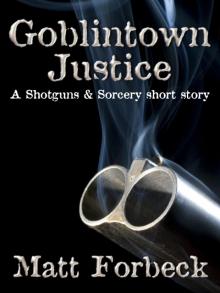 Goblintown Justice
Goblintown Justice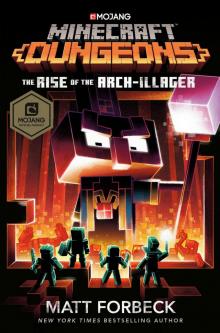 Minecraft Dungeons
Minecraft Dungeons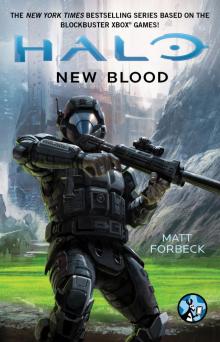 New Blood
New Blood Amortals
Amortals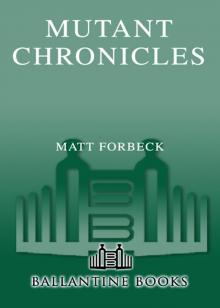 Mutant Chronicles
Mutant Chronicles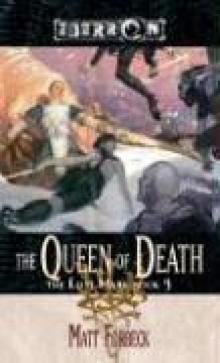 Lost mark 3 The Queen of Death:
Lost mark 3 The Queen of Death: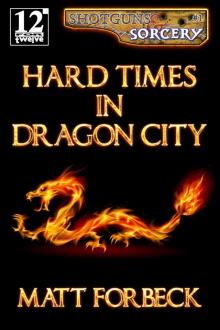 Hard Times in Dragon City
Hard Times in Dragon City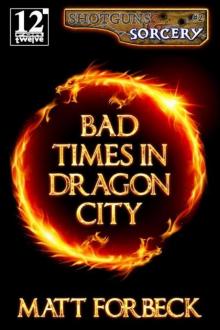 Bad Times in Dragon City
Bad Times in Dragon City Legacy of Onyx
Legacy of Onyx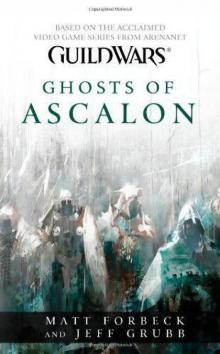 Ghosts of Ascalon (guild wars)
Ghosts of Ascalon (guild wars)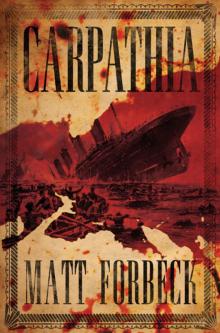 Carpathia
Carpathia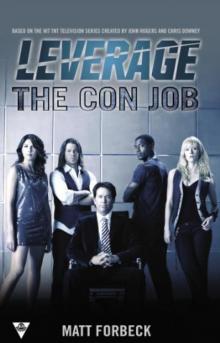 The Con Job
The Con Job End Times in Dragon City
End Times in Dragon City